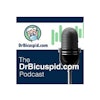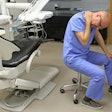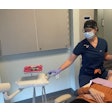
Students training for dental professions are at increased risk for poor mental health that could lead them to leave their programs, especially during the COVID-19 pandemic, according to a study published recently in the Journal of the American Dental Association.
For the study, 126 dental trainees at the University of Washington (UW) School of Dentistry completed a survey in August and September of 2020. The research team sought to understand how anxiety, burnout, depression, and the COVID-19 pandemic have affected trainees' overall mental health and the corresponding intention to leave dentistry programs.
"Poor mental health is common among dental trainees and is associated with intention to leave their program," wrote the group, led by Dr. Donald Chi, PhD, a professor of oral health sciences at the university (JADA, March 12, 2021).
The researchers gave trainees, including predoctoral dental students, graduate students, and postdoctoral residents, an 83-item questionnaire to better understand the factors that could lead students to leave their programs. All trainees at the UW School of Dentistry were eligible to participate in the study, and responses were captured anonymously.
The survey asked multiple-choice, checklist, and open-ended questions about mental health and intentions to leave a program. It also covered substance use, isolation from peers, professional support systems, and unmet needs.
Out of the 126 trainees who completed the survey, 22% had symptoms of anxiety, 17% had symptoms of depression, and 29% reported at least one symptom of burnout. In addition, 13% of all respondents had an intention to leave their program.
Participants reporting anxiety, depression, or burnout were up to 11 times more likely to report an intention to leave the program than respondents who did not meet the diagnostic criteria for those conditions. These findings are a cause for concern, Chi and colleagues noted.
"At least one-in-five trainees has clinically significant psychological symptoms that are known to be distressing and may interfere with everyday functioning," they wrote.
Furthermore, 69% of respondents said the COVID-19 pandemic was affecting their overall mental health. In addition, all participants who stated the pandemic affected their mental health reported plans to leave.
"The COVID-19 pandemic may compound the effects of poor mental health -- to which dental trainees are predisposed because of the rigor and intensity of training," the authors wrote.
The study had some shortcomings, including an overall survey response rate of 36%. The survey could be biased toward healthier students because the responders reported lower levels of anxiety and depression than what is found in the general U.S. population, the authors noted.
The study also focused on only one dental school. In the future, a nationwide study of more schools would result in more representative data.
"Poor mental health was common among surveyed dental trainees, which may have been exacerbated by fallout from the COVID-19 pandemic," the authors wrote. "These findings support concerted efforts to promote wellness among dental trainees as a way to address unmet mental healthcare needs and prevent adverse outcomes associated with poor mental health."



















